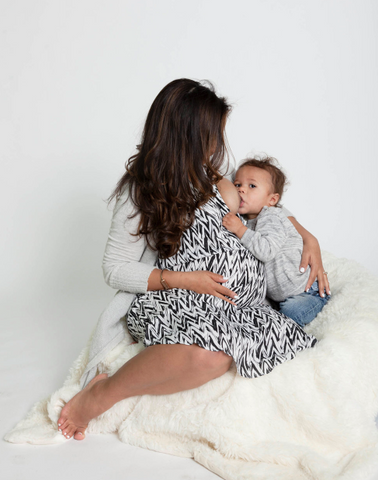The truth about breastfeeding while pregnant

You may have questions about safety and risks if you're breastfeeding while pregnant. Here’s everything you need to know.
As a mom, you’ll do everything you can to keep your little ones safe – be it the one growing in your bump or the one nursing. And when you’re taking care of both at the same time, you might face more than the usual anxieties and questions, such as, is it safe to breastfeed while pregnant?
Read on so you can make an informed and comfortable decision.

Is it safe to breastfeed while pregnant?
There are a lot of myths and misconceptions out there about breastfeeding while expecting. The truth is, it is perfectly safe to do so if your pregnancy is uncomplicated and low risk. In fact, it can actually be beneficial for both you and your baby. For instance:
Breastfeeding can help reduce morning sickness.
Some women have found that breastfeeding helps to reduce morning sickness while expecting. So, breastfeeding may be a good option to consider if you are struggling with nausea and vomiting.
Breastfeeding can help ease some of the discomforts of pregnancy.
It’s also been found that breastfeeding could help relieve some of the discomforts of pregnancy, such as back pain or fatigue. Unfortunately, the other side of the coin is also true, some women complained about increased pain and discomfort, especially as their breasts and nipples become more tender. One way to soothe tender breasts is wearing maternity clothes specially designed for breastfeeding.
Breastfeeding can help you feel calmer.
While nursing, your body releases oxytocin, a hormone that has calming and relaxing effects. Oxytocin stimulates breast milk production, but can also cause mild uterine contractions. You have nothing to worry about if your pregnancy is uncomplicated and low-risk.

What you should know about breastfeeding while pregnant
Although it is generally perfectly safe to breastfeed while pregnant, there are a few potential risks to be aware of. These include:
Increased risk of mastitis
Mastitis is a condition that can occur when milk ducts become blocked or infected. When breastfeeding while pregnant, your breasts may be more susceptible to this condition.
Changes in milk production
Keep an eye on your milk supply. As your body and hormones change during your pregnancy, your milk supply might decrease and change in taste and consistency.
Limited variety of positions
Due to the increased size of your breasts and abdomen, there may be limited comfortable positions for you to breastfeed in while pregnant. So, experiment with different positions to find what is most comfortable for you and your baby.

Tips for breastfeeding while pregnant
- Avoid tight and uncomfortable clothing that could restrict milk flow.
- Pregnancy and breastfeeding both require a lot of energy, so it’s important to ensure you’re taking in enough calories to maintain your own overall wellness. A general rule of thumb is:
- 500 extra calories needed if your breast milk feeding child is also eating other foods or 650 extra calories needed if he or she is under 6 months old.
- This is in addition to the 350 extra calories needed if you are in the 2nd trimester of your pregnancy or the 450 extra calories needed if you are in the 3rd trimester of your pregnancy.
- breast tenderness is a common symptom of pregnancy. Invest in breast and nipple care. You probably already know that sore nipples can be a frequent ailment for breastfeeding moms, but this can be especially noticeable if you are expecting and breastfeeding
- A drop in milk supply is a normal part of pregnancy. Your toddler will probably show an increase in appetite, and may even start to wean from breastfeeding.
- Talk to your toddler about sharing the breast once baby arrives.
- It’s important for the new baby to get a good “dose” of colostrum, so in the first few days after the birth you may want to limit the toddler’s feedings and try to always nurse the baby first

Remember: always consult your healthcare provider
Before making any decisions about breastfeeding while pregnant, you must talk to your healthcare provider. They will be able to give you the most accurate and up-to-date information based on your individual situation.
Many things can lead to concerns and anxieties while pregnant and/or breastfeeding, but your clothes should never be on that list. At Happily Ever After Maternity, we source the highest quality maternity clothes and nursing bras for expecting and breastfeeding mothers to keep you looking and feeling your best. Best of all, once you no longer need it, we will resell it on your behalf.
Helpful Resources In no particular order
https://www.breastfeeding.asn.au/resources/breastfeeding-through-pregnancy
https://naitreetgrandir.com/fr/grossesse/trimestre1/breastfeeding-during-pregnancy/
https://www.medela.us/breastfeeding/articles/5-important-tips-for-breastfeeding-while-pregnant
https://www.todaysparent.com/pregnancy/being-pregnant/breastfeeding-while-pregnant/
https://americanpregnancy.org/healthy-pregnancy/breastfeeding/breastfeeding-while-pregnant/
https://www.laleche.org.uk/pregnant-and-breastfeeding/

